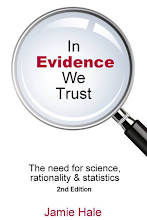Cognitive scientists recognize
two types of rationality: instrumental
and epistemic. A simple definition of
rationality is behaving in the world so that you get exactly what you most
want, given the resources (physical and mental) available to you. The other
aspect of rationality studied by cognitive scientists is termed epistemic
rationality. This aspect of rationality
concerns how well beliefs are corroborated by actual evidence. Instrumental and
epistemic rationality are related.
Does emotion thwart
rationality? The claim that emotion
inhibits rationality is not consistent with definition of rationality in modern
cognitive science. Instrumental
rationality is behavior consistent with maximizing goal attainment. There is no specific psychological process at
work here. Emotions may enhance
instrumental rationality, or they may impede it. Emotions provide an
approximation of the correct response.
If more accuracy than that is required, then a more precise type of
analytic cognition will be required (Stanovich, 2009) It is possible to rely too much on the
emotions. We can base responses on an
approximation when what is really needed is a more precise type of analytic
thought. More often than not, processes
of emotional regulation enhance rational thinking and behavior.
Neurology of decision making
People with damage to an area
in the prefrontal cortex, the ventromedial area, are often irrational. This is because their processes of emotional
regulation are deficient (integration of cognition and emotion). Emotion is one
of many tools of rational thought.
An emotion may be defined
as a collection of changes in the brain and other parts of the body triggered by a dedicated brain system that
responds to one’s perceptions. (Damasio
1994, 1999, 2003, 2005). These changes
range from modification of the internal environment and viscera that may not be
perceived by an observer (e.g., endocrine activity, heart rate, micro-sweating) to changes in the
musculoskeletal system that may be obvious to an observer (e.g., posture,
facial expression, specific behaviors such freezing, aggression, voice variation and so
on). Humans have different types of
emotional experiences.
In the past 25 years, Damasio and
colleagues have studied several patients with lesions of the ventromedial
prefrontal (VM) cortex who showed impairments in judgment and decision-making. The case of Phineas Gage spearheaded the way
for the idea that the frontal lobes were associated with judgments,
decision-making, social interactions, and personality. There are reports of numerous cases of people
with frontal lobe damage that show defects similar to those of Phineas Gage. (As cited from Damasio, 2005- Brickner, 1932;
Welt, 1888 ).
“Patients with bilateral damage
to the VM prefrontal cortex develop severe impairments in personal and social
decision-making” (Damasio, 2005, p.337) . They have difficulties planning their day, as well
as difficulties in various types of social activities. They do not learn from previous mistakes as
reflected by perseveration of decisions that lead to negative consequences.
VM patients generally produce average scores
on general neuropsychological tests,
however, they have a decreased ability to express emotion and experience
feelings in appropriate situations. To
reiterate, they demonstrate abnormalities in decision-making. Emotions are key factors involved in the
interaction between environmental conditions and decision making.
“The
process of deciding advantageously is not just logical but also emotional” (Damasio,
2005, p. 368)




